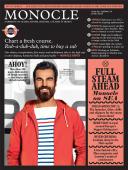
Issue 94
Chart a fresh course. Rub-a-dub-dub, time to buy a sub. Our editors, correspondents, first mates and midshipmen take to the high seas to cover disputes, handsome hulls and good tackle.
In This Issue
Oops! No content was found.
Looks like we no longer have content for the page you're on. Perhaps try a search?
Return Home

